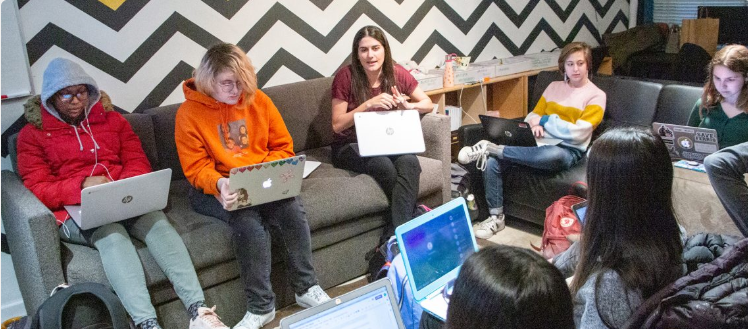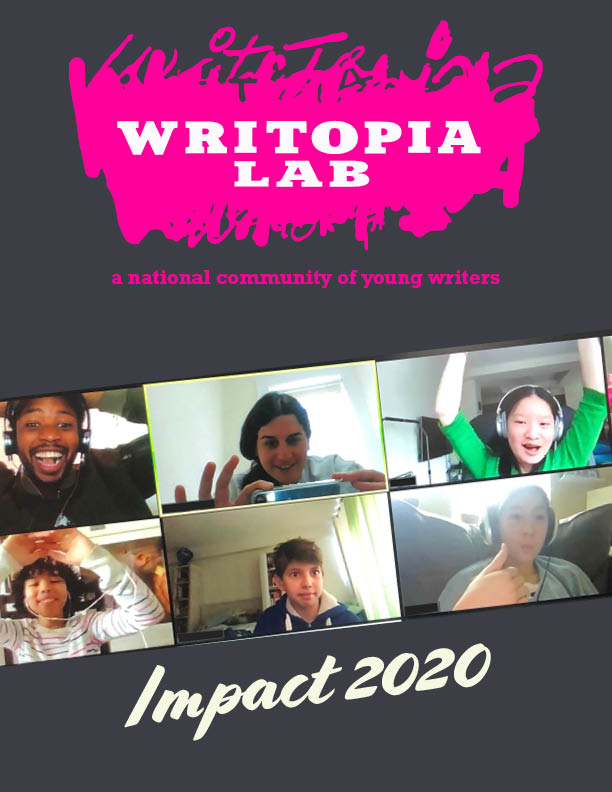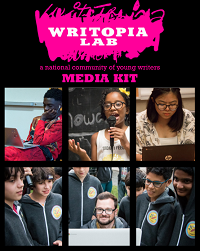August 14, 2019
HEALING THROUGH STORY
(First published by the Columbia University School of Social Work)

Danielle Sheeler (in red T-shirt) with a group of her writing students at Writopia (taken with their permission).
At Writopia Lab, Danielle Sheeler (MSW’19) has created an innovative narrative therapy program for youth.
It’s late afternoon, and inside a nondescript building on the Upper West Side, a number of teens are settled on couches in a homey, casual room outfitted with donated furniture, laptops balanced in their laps. Their writing teacher, Danielle Sheeler, sitting in the middle, is encouraging them to reflect on how they came to be here. What was their personal journey that led them to this after-school program? Soon, she says, each of them will have a chance to tell their story of how they came to this particular crossroads.
The students are all enrolled in Narrative Therapy, a course of Sheeler’s own design offered at the Manhattan branch of Writopia Lab, a New York City-based nonprofit whose mission is “to foster joy, literacy, and critical thinking” through creative writing. A 2019 graduate of the School of Social Work, Sheeler was already working for Writopia when she entered Columbia’s MSW program. Designing the course counted as part of her field work.
Before coming to Writopia, Sheeler was an experienced teacher of writing—and was also a produced playwright with a masters in Humanities and Social Thought from New York University’s interdisciplinary Draper Program. But she now thinks she has found her true calling in narrative therapy—a method that combines her love of writing and teaching with her passion for helping young people tell, write, and rewrite their own stories in ways that can help them better their lives.
What Is Narrative Therapy?
Narrative therapy is an approach that centers on the stories people tell about their own lives, along with the stories of gender, class, race, culture and sexual identity that are told within the broader social context and help to shape individual life stories.
Sheeler first encountered this method in a first-year Family Therapy class at Columbia School of Social Work. She was assigned to read the work of Michael White and David Epston, the founders of Dulwich Centre in Adelaide, Australia, considered to be one of the main homes of narrative practice.
White and Espton are credited with coining the term “narrative therapy” when developing a practice that would help people facing trauma and hardship tell their stories in ways that make them stronger.
SEE: “What is Narrative Practice? A free course,” created by Dulwich Centre Foundation
Intrigued by what she read, Sheeler—who, as a reduced residency student, was able to continue her work at Writopia—proposed to create a new type of Writopia workshop based on Epston and White’s concepts, as part of her field placement. She would also draw on the methods of cognitive therapy (CT), a type of psychotherapy developed in the 1960s by American psychiatrist Aaron Beck. CT encourages clients to come up with alternative ways of thinking and behaving and thereby reduce their psychological distress.
Sheeler did not know it at the time, but she was contributing to an already rich Columbia University tradition. Columbia University’s School of Medicine was first to develop educational programs for narrative medicine, an interdisciplinary field that brings the narrative skills of radical listening and creativity from the humanities and the arts to address the needs of all who seek and deliver health care.
Social workers, too, have become involved in the narrative method, with former School of Social Work professor Ann Burack-Weiss (she now teachers in Columbia’s Program in Narrative Medicine) leading the charge. Weiss co-edited the book Narrative in Social Work Practice: The Power and Possibility of Story (Columbia University Press, 2017), a collection of testimonies from social workers about their success with incorporating narrative techniques into their work—from processing their own responses to clients’ trauma to running a narrative workshop for mothers whose children are in foster care.
A Comfortable “Third Space”
Sheeler describes Writopia as a unique “third space”—neither home nor school—where her young clients feel relaxed and safe. “Normalization” is an important aspect of her approach, she says. Because narrative therapy is just one of many writing workshops listed on the Lab’s website, the therapy is not stigmatized but becomes “just a different form of expression.”
Many of the children and teens Sheeler sees are having behavioral problems related to social anxiety, low self-esteem, or attention-deficit hyperactivity disorder. Parents enroll their children in ten-week-long group workshops and sometimes in private sessions as well.
Once the youth get in the door, Sheeler chooses from a range of treatment approaches, and not everything she suggests involves writing. When people hear “narrative therapy” in the context of Writopia, “they think it’s solely writing, but I have to reframe it a bit,” she explains. Some of the younger children may tell their stories aloud, and sometimes Sheeler will tease out their stories by asking them questions while they are doing a physical activity such as throwing a ball. “It’s like play therapy,” she says. “We focus on another task so the child feels comfortable revealing what’s going on.”
Noting that the Manhattan Writopia has a room equipped with a keyboard and electric guitars, Sheeler adds that some of her young clients play instruments and spend half the session in “band mode.”
Teens, however, tend to respond well to writing exercises. “A lot of what they’ve been experiencing is framed in their writing, so I get a lot within an hour.” She often has them write in response to a writing prompt such as “I hate it when…” or “I feel motivated by…” Many of them also thrive in a group setting. “They know somebody else is doing it, and it’s not as high pressure,” she says.
By the same token, she adds, young people benefit from peer feedback, not only on their writing but on their behavior in the group. They “reflect to each other and call each other out in a way that’s better coming from them than from me.”
When she sees that a young client is having trouble revealing what’s troubling them, she might ask the student to rewrite a first-person story in the third person. Developing a character can help them reframe experiences and provide detail and nuance, she says, noting that Epston and White found that externalizing the situation helps clients be less judgmental.
What outcomes has she seen thus far? Although the program hasn’t been running for long, Sheeler says she’s noticed some of her students seeming less anxious. Also, some of those with learning disabilities have been showing signs of improvement. Likewise, parents have told her that their offspring’s school grades and literacy scores have risen since the child’s involvement in her course.
Growing the Program
As Columbia graduation approached, Sheeler documented her curriculum so that another Columbia MSW student could continue the work in September. According to Writopia’s founder and executive director, Rebecca Wallace-Segall, Sheeler’s narrative therapy workshop is a perfect fit. Despite having a clinical goal, she says, “it’s still essentially a creative writing program.” The difference is that “it’s a deliberate processing of our lives through the writing. Whereas in our regular workshops it’s therapeutic, but not deliberately therapeutic.”
Writopia already draws students and graduates from Columbia and Barnard writing programs for its internships and instructor positions. Now Wallace-Segall hopes that the new field placement will create a pathway for Columbia-trained social workers to contribute their skills and perspectives.
Sheeler for her part is pleased that Writopia will continue to offer both group workshops and private sessions to its existing clients, as well as reaching out to community-based organizations that could benefit from the program. Sheeler’s MSW degree, with a concentration in Advanced Generalist Practice and Programming, has equipped her to look broadly at policy and research related to therapeutic writing, and she would like to see the popularity of the program spread. “I would love to just grow this,” she says.
Just For Fun
Have a birthday? Party with us! Have your very own Writopia Lab Birthday Party.
Check out our online store and take a piece of Writopia Lab home with you!
Writopia Lab in the News
- Celebrating a Decade of Partnership: HFH’s Tierra Gunther Honored at Writopia Lab’s 2025 Gala
- AWS in Kimball Union Magazine Fall-Winter 2025
- A Cry to The Education System: New York’s Reading Mandate Could Be the Hope for Literacy Proficiency & Individuality
- Why Writing is the Ultimate Leadership Skill with Rebecca Wallace-Segall
- Whose text is it: the student's or the artificial intelligence's?
- Writopia in The Forward
- CUNY Newsletter
- Mommy Poppins List 2023
- CUNY TV Spotlight
- Writopia Gets Kids to Tell Their Stories (Village Voice)
- Partnering for Literacy Impact: By Susan Matloff-Nieves & Rebecca Wallace-Segall
- Ridgefield Resident Sofia Schaffer is Writing a Name for Herself
- Inviting Joy into Classroom Writing Instruction: by Danielle Sheeler
- Columbia University News
- Education Week
- New York Times: Worldwide Plays 2019
- The Rockridge News: Local Creative Writing Workshops
- LA Times HS Insider: Writopia at 4th Annual YALLWEST
- Townvibe Bedford: Writopia's Léna Roy Speaks on "A Wrinkle in Time"
- Oakland Magazine: Coolest New Writing Lab for Kids
- The Washington Post: Writopia Lab for Introverted Children
- The Washington Informer: SEED Students Honored at Scholastic Writing Awards
- Broadway World: Writopia Lab's Worldwide Plays Festival
- New York Family: Alternative Summer Camps
- New York Times: Family Memoir Workshop
- Washington Post: 7 Ways to Get Kids Excited About Writing
- New Paltz Oracle: Writopia as a Creative Outlet for Kids
- Forward: Rebecca Wallace-Segall, founder of Writopia Lab
- Washington Independent Review of Books: Writopia Open House, June 12th, 2016
- ICPH Uncensored: Writopia Lab's Worldwide Plays Festival
- The BACC Rag: Annelie Hyatt Performs at the Nuyorican
- CBS LA: Summer Activities For Kids In Los Angeles
- DC Public Library: Creative Writing Workshop Series
- Arizona Daily Star: St. Gregory Seniors Win National Play Contest
- Book Culture: Writopia Lab Reading
- Take Part: A Case for More Creative Writing
- in Reads: The Founding of Writopia
- New York Nonprofit Press: Writing Your Way to Success
- Johns Hopkins: Writopia's Younger Students Create at JHUMCC
- Georgetown Patch: DC Students' Plays Produced Off-Broadway
- NPR: 2013 Scholastic Art & Writing Awards
- Jersey City Independent: JC 11-Year-Old’s Play ‘9/11’ Showcased in New York Festival
- New York Times: 13-Year-Old Writopia Playwright
- Bronx Neighbors: 12-Year-Old Writopia Playwright
- Voice of America: Program Nurtures Young Writers
- Washington Post: Inside a Writopia D.C. Workshop
- Time Out Kids: Writopia Summer Camps
- The Atlantic: A Plea for Creative Writing in Schools
- NY1: Young Playwrights Get Works Performed At Festival
- Mommy Poppins: Best New NYC Summer Day Camps for Kids
- The Epoch Times: Interview with Rebecca Wallace-Segall, founder of Writopia
- Shelf Awareness: Writopia's Lena Roy Featured at Voracious Reader
- New York Times - Arts Beat: Interview with Writopia Playwright
- Park Slope Patch: Park Slope Teen Grier Montgomery's Play Selected for Writopia's 2011 Worldwide Plays Festival
- New York Times - City Room: Interview With Dan Kitrosser, Artistic Director of Writopia's 2011 Worldwide Plays Festival
- The Arlington Connection: Writopia Lab Brings the Scholastic Arts & Writing Awards to D.C.
- Alexandria News: DC Scholastic
- Huffington Post: 2011 Plays and Workshops
- Time Out New York: 2011 Plays Contest
- Time Out New York Best of 2010: Camps
- New York Mag: Bryant Park Listing
- New York Times: Bestival
- Cornwall-on-Hudson News: Lena Beckenstein
- Time Out Kids: Radiant Windows
- Northwest Passages: DC Teen Contest
- The Wall Street Journal: In Praise of 'Thought Competition'
- The Jewish Week
Our Mission
Writopia Lab fosters joy, literacy, and critical thinking in children and teens from all backgrounds through creative writing.
We have never turned away a student whose family was unable to pay for workshops. Fifty percent of our students attend on either partial or full scholarships.
Enroll Now!
Weekly Trimester-Long Workshops
Check out the Weekly Trimester-Long Schedule.
Holiday & School Break Workshops
Check out the Half-Day and Full-Day schedules.
Join the Team!
If you love writing and want to share that love with young writers, apply today to join Writopia Lab! Click here to learn more!
Summer Camp!

